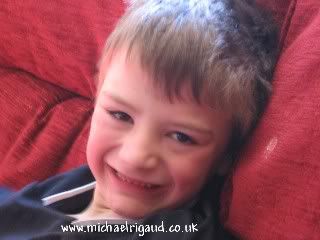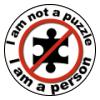I feel I need to bring this up, the subject of Autism diagnosis, the history of such diagnosis, and the history of blame. The subject has been brought up on another blog I read regualarly, My Son has Autism. I have discussed this subject and post with Kristina and it is with her permission that I link and quote from her blog, and I thank her for allowing me to do this.
Kristina brought up the subject of Autism 'experts', and the origional belief held by many 'professionals' that Autism was caused by refrigerator mothers.
Kristina says in part of her piece that :-
"autism parents are in particular need of this, in part at least to debunk the much-refuted notion of autism parents (and especially mothers) as the cause of what is a biological, neurological condition. No parent, certainly, or teacher, or therapist, or doctor, or psychologist, or school or other governmental administrator, gives any credence to the notion of autism as caused by refrigerator mothers. But cultural attitudes can last for a long time in us, albeit unconsciously, and I do think that there are many, many misperceptions about "what autism is" among the general public and even among us parents and professionals."
I am according to the family therapist we saw, one of those refrigerator mothers.
Unfortunatly it appears that this theory is still very much alive and well, amongst some of todays professionals, and I am sure Kristina will agree with me on this. There are those out there, who still hold the values of Freud, Kanner and Bettleheim to heart, and pass them to the next generation of therapists etc who then take these beliefs on board.
My son was not born in 1943, he was born in 1999, and in May 2003, some 60 years after Kanner wrote his classic article I was told that my son's problems were my fault, they were due to depression, my anger, and my inability to bond with him.
The therapist stated that I had a distant / ambivilant attachement towards Michael. She descibes me as being angry with Michael because he has destroyed any hopes I had of having a normal child, and because of this I allow any kind of behaviour including defacating on the carpet. She finishes off by saying that "it is sad that this child cannot be given the help he could benefit from because mother refuses to return for a further appointment."
Kanner wrote his "classic" article Autistic Disturbances of Affective Contact in 1943, in it he states:
"There is a great deal of obsessiveness in the family background, the very detailed diaries and reports, and the rememberance, after some years, that the child learned to recite 25 questions and answers............."
The therapist we saw described me as "clinical" Most parents of children with any kind of medical history know that history inside out, they have them burned in their minds, we know what our children have been through, we know what battles our children have faced, and in most cases we are the only ones who have the complete picture, unlike us no-one professional is there for every single part of our childrens lives.
So yes I fall into this category, I have very detailed diaries, I have all Michael's reports filed away together, I write background histories for new Dr's because it saves having to go through it all again. It's there written in black and white, does that make me obsessive or organised? (Or maybe fed up of repeating myself over and over again!?)
"One other fact stands out prominently. In the whole group there are very few warm hearted fathers and mothers." he then goes on to say "The question arises whether or to what extent this fact has contributed to the condition of the children"
The following is taken from an article The Brutality of Dr. Bettelheim by Martin Gardner
Bruno Bettelheim was convinced, in spite of overwhelming evidence to the contrary, that autism had no organic basis but was caused entirely by cold mothers and absent fathers.
"All my life," he wrote, "I have been working with children whose lives have been destroyed because their mothers hated them."
Again: "The precipitating factor in infantile autism is the parent's wish that his child should not exist."
In the mid-fifties Bettelheim adopted a policy known as "parentectomy." Under this policy, parents were not allowed to see their children for at least nine months!
You can imagine the desolation felt by mothers when they were told they had created their child's pathology. Annabel Stehli, one of many such mothers, read Bettelheim's book about autism, The Empty Fortress (1967),
Stehli described her reaction this way:
I was carrying around this terrible secret. I didn't want to talk to anyone about Berrelheim. My husband said that he thought it was baloney, but I didn't talk to my friends about it.
I was very alone. I really felt as if I had a scarlet letter on, only the "A" was for "Abuse."
I felt that I'd hurt Georgie in some subtle way that I couldn't grasp, and if I could just figure it out, then maybe she'd be okay. There was a part of me that wanted to believe Berrelheim, because that would mean that if I got better, Georgie would get better.
Stehli and I may be seperated by decades, but the feeling of being blamed for causing your child's difficulties, and the devastation that it leaves you with, are no different now than they were in 1967.
I actually considered putting Michael and his siblings up for adoption, following the session with the therapist. The Social Services dept was only a few doors down from where I had been torn to pieces......... Why?? because I believed that if I was doing them so much harm, that they would be better being raised by someone who could solve the difficulties. Someone who was obviously so much better at parenting than I am, someone who would cause them no harm.
I was not depressed when I went in to see the therapist, a little stressed maybe, but I was downright suicidal by the time I came out, funny how much can change in such a short period of time.
This therapist played on every weak nerve and feeling that I have. I still carry around a large amount of guilt because of Michael's birth, and I will admit in the early days I did not bond well with this technology dependant baby, it's not always easy to see the baby for the machines..... at the time I found it hard to believe that he would survive. Not getting too close was my way of protecting myself from the heartache that in my opinion was bound to come when he died. So yes, I have guilt over my initial feelings towards Michael; but I am aware that it was also self-preservation.
As Michael grew we developed and adapted our ways of communicating or at least trying to communicate, to understand what he was trying to tell us. It didn't take long to realise that interaction is done on his terms. If he was actually sitting and doing something we learnt to leave him, we learnt that to try to join in, usually resulted in Michael leaving. We knew if Michael was having a tantrum over a video, that we would go through half a dozen video's before finally settling on the first one.
We worked with everyone we thought could help us learn how to communicate with Michael. We learnt to speak in simple bullet points, such as "good sitting" or "good looking" we used PECS, we had pictures of objects velcro'd all over the house, we tried sign language, and I have to confess Michael is so much better at it than me.
Does that make me cold and aloof or does it make me, like many other parents of children with Autism, tuned in, or trying to be as tuned into my child as possible, without over-stepping the boundaries my child has?
The therapist, refused to accept that having been born so prematurely, and having been so sick for so long, could have had any impact on Michael's development. She refused to accept that he was developmentally delayed. This she stated was because of my inability to treat him as a 3 year old, repeatedly telling me that, "unless you treat him as a 3 year old, he will never be a 3 year old."
She alledgedly managed to see something in my relationship with Michael, that no other professional has seen in the years that we have been working together. At no point through all our difficulties, has anyone ever questioned our relationship with Michael. Whilst everyone else we were dealing with was working towards Autism -
and this is where I come unstuck..............
Was it that she could see the "Autism in my son", and she chose to ignore it?? He was 3 years old, he was non-verbal at that time, he spoke 1 word and that was 'bye' as we were leaving. He behaved no differently in that room to how he behaves at home, he was fascinated by her necklace and the stockings that she wore on her legs, moving himself between the two. He recoiled in horror when she removed the necklace.....(it's as if he thinks the head will follow! You can see the look of fear in his face) He backed off when she tried to interact with him. As with many Autistic kids, we've come into contact with, interaction is ok, as long as it is on Michael's terms.
Or was it that all she could see was me, and she didn't see my child at all??
I have to say I think, it is the latter, all she could see was me, she was not prepared to look any further than her strongly held beliefs that children's problems ultimatly stem from their mothers.
My husband, like Stehli's, thought she was talking a load of twaddle, but despite that, her words hit a weak spot, my guilt, and caused a lot of grief, a lot of tears, and finally a lot of anger.
Three months after our visit with her Michael was diagnosed with Autism, and my first question was........... "Is it my fault???"








No comments:
Post a Comment